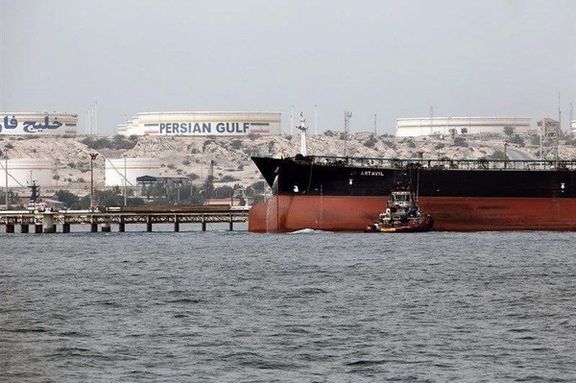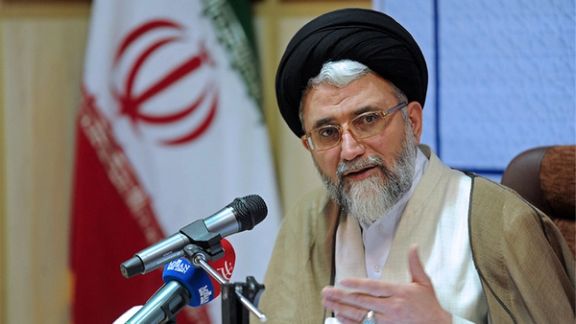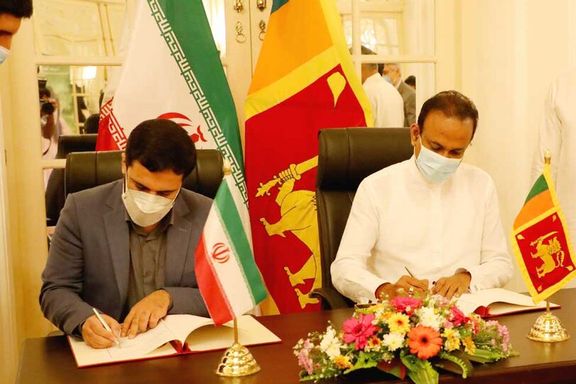Large Oil Discounts By Iran Entice Buyers To Ignore US Sanctions

The Iranian government’s official newspaper has said that Iran sells its oil so cheap that the risk of circumventing US sanctions is worth taking for buyers.

The Iranian government’s official newspaper has said that Iran sells its oil so cheap that the risk of circumventing US sanctions is worth taking for buyers.
The Iran Daily wrote that the Islamic Republic is selling its oil at such low prices that it is worth for foreign buyers to circumvent US sanctions, which carry third-party penalties for established companies.
The article said that the discounts offered are so enticing that crude oil exports have been increasing.
It said that oil sales to China in November increased by about 40 percent compared with the figure for October, reaching about 18 million barrels, equivalent to about 600,000 barrels a day.
Bloomberg reported that China allowed small "teapot" refineris to import more oil in October for 2021 and they rushed to buy more Iranian supplies. But this is a temporary change that might not last long.
However, according to Kpler, a provider of data and analytics for commodity markets, that said official Chinese data indicate China hasn’t taken any Iranian oil since December 2020. The report said supplies have often been re-branded as originating from Oman and Malaysia.
Iran's illicit oil exports go through middlemen who also take a large commission to arrange forged documentation hiding the real point of origin.

Iran’s former president Hassan Rouhani has warned the Supreme Leader over the economic perils of delaying a nuclear deal with the West, some sources have said.
One day earlier a journalist in Iran tweeted that Rouhani met with Ali Khamenei for one hour in recent weeks. So far there is no official confirmation or denial about the report.
Paris-based analyst Reza Alijani told Iran International TV on Monday that a group known as "the wise men" including Rouhani, former Parliament Speaker Ali Larijani, former conservative lawmakers Morteza Nabavi and Mohammad Reza Bahonar, and others, have warned Khamenei about the dire situation of the economy and called for reaching an agreement with the West, particularly the United States, before the economic crisis endangers the regime.
One more source who is in Iran related a similar account of the meeting.
The same group was assembled in late 1980s and urged Ayatollah Rouhollah Khomeini to end the war with Iraq and reduce tensions between Tehran and Washington to save the regime.
At the time, Khomeini disbanded the group but took their advice, admitting that it was a "chalice of poison" he had to drink.
Alijani told Iran International TV that Rouhani communicated the group's message to Khamenei in his recent meeting with him, but Khamenei also ordered the group to stop their meetings. However, it is not yet known if he accepted to consider the group’s suggestion. Nonetheless, Alijani observed that during recent days, Iran has been withdrawing from some of its hardline positions in the nuclear talks.
Alijani mentioned that Tehran has accepted to allow the UN nuclear watchdog, the IAEA to reinstall cameras in a nuclear workshop in Karaj. Tehran has also stopped mentioning its demand for lifting all US sanctions first for talks to continue, and its rhetoric about a US guarantee not to withdraw from the agreement again.
However, everyone in Iran, as well as politicians and negotiators abroad are convinced that it is Khamenei who makes the final decision about the nuclear issue and other political matters in Iran.
Alijani said that Iran is in a “state of emergency” as far as the country's economy is concerned. Nonetheless, Khamenei might insist on his hardline positions and may not accept a settlement although the West has agreed to lift the JCPOA-related sanctions and accepted to limit the discussions to Iran's nuclear program.
Under economic pressure, Khamenei has to make some sort of compromise and return the nuclear program to where it was before the 2018 US pull-out, but he might still choose the worst-case scenario of carrying on with his non-compromising positions, which would lead to “a catastrophe for the Iranian nation”, Alijani maintained.
In the meantime, Iran’s economy is in its worst situation since the 1979 revolution and the new Iranian government led by staunch hardliner Ebrahim Raisi has brought the economy to a standstill partly because six months after his election, neither he nor his government know who is in charge of the economy. His minister of economy is said to be on the verge of being impeached by the parliament for failing to sort out the crisis.

As criticism over Iran’s proposed budget echoes in local media, a former lawmaker says the top leadership has decided to reach an agreement with the West.
Mehrdad Lahouti told Aftab News, a Tehran political website that this year’s budget is not much different from previous ones in facing a serious deficit and the country's top leadership has apparently decided to solve its issues with the West.
He was was quoted on Sunday as having said that as long as Tehran does not improve ties with the world, “we cannot be hopeful about an improvement in people’s lives.”
Meanwhile, the head of the Budget and Planning Organization, Massoud Mirkazemi has written to President Ebrahim Raisi that a 10-percent extra pay in the current budget plan cannot be met because there is no money for it.
Mirkazemi has proposed to sell assets of medical universities and the government to raise money. He has admitted that targets this year for selling government property have not been met, reducing budget revenues.
Iran has faced serious budget deficits since the United States withdrew from the Obama-era nuclear agreement known as JCPOA in 2018 and imposed sanctions that have denied tens of billions of dollars in oil revenues to the Islamic Republic.
Lahouti argued that the main sources of revenue for the proposed budget to start in March 2022 are oil exports and more taxes. The budget draft is based on the projection that Iran can export 1.2 million dollars of crude oil per day next year, but the proposition depends on lifting of US sanctions.
Tehran is currently negotiating with world powers over reviving the JCPOA, which would lift the oil sanctions, but if these talks fail or are delayed it cannot sell the expected amount of oil.
Lahouti said that in such a scenario the government has to resort to borrowing from domestic markets, but he did not mention that cash has dried out and internal capital markets cannot lend billions of dollars to the government. That means the Central Bank will resort to printing money as in past years, driving up inflation that now stands close to a 50-percent annual rate.
But the former lawmaker did highlight that the government is planning to also borrow around $5.5 billion from its foreign currency reserve fund. Information about the fund is a state secret but observers agree it has declined substantially from more than $100 billion a decade ago to perhaps less than $30 billion.
Despite the unsurmountable budgetary problems, the Raisi administration has promised 8 percent economic growth, a figure Iran has never achieved before. Lahouti said that to get to that level of growth, the country would need $65 billion in foreign investment – again a figure the Islamic Republic has not seen in its 42-year existence.
But Lahouti said he believes that the top leadership has concluded it needs to solve its problems with the West, and “that is why Iran’s negotiators are in Vienna trying to reach an agreement with the West.”

Iran’s intelligence minister Esmail Khatib says despite pressure by the United States and its allies Tehran currently has fewer problems in selling oil.
Iran’s oil exports have increased in the past one year compared with 2019-2020, according to business intelligence groups, but are still well below 2 million bpd exported before US sanctions were imposed in 2018.
Khatib also said that Iran’s access to its foreign currency reserves have also increased.
Iran does not officially announce the foreign currency reserves as a matter of policy and all figures are estimates calculated by international or foreign institutes. However, Iran’s currency has fallen by more than 20 percent since August, which is not an indication of access to foreign currencies.
In its regional report for the Middle East and Central Asia, the International Monetary Fund (IMF) has said Iran’s accessible international reserves was $4 billion in 2020, that is a tiny fraction of the $122.5 billion of reserves the country held in 2018.
In its latest Regional Economic Outlook, the IMF said Iran’s “oil activity will remain subdued in the short term, reflecting the OPEC+ production curbs and continued US sanctions.”
Islamic Republic has dipped into its foreign reserves to make up for the loss of oil revenues.

Iran has been able to boost oil exports to the extent that it has helped the economy grow by 3.3 percent this year, the government's news website said Friday.
The Islamic Republic News Agency, IRNA said that in the first six monthsof last Iranian year economic growth was 1.8 percent and because of more oil sales it reached 3.3 percent since March 21, when the new calendar year started.
The fact that Iran is selling more oil in 2021 has been reported by international oil trade and shipping monitoring firms, such as Kpler, that has said Iran this year is selling twice as much oil as in 2020.
Iran’s oil exports dropped from more than 2 million barrels per day in 2016-2017 to less than 200,000 in 2019, but started to grow in September 2020, before the US presidential election. No one can say with any certainty how much Tehran is exporting but estimates say volumes reach over 600,000 barrels per day.
Some have argued that this is because of less enforcement by the Biden Administration that has been indirectly negotiating with Iran since April trying to restore the 2015 nuclear agreement. The Administration denies it has been looking the other way, but somehow Tehran is shipping more oil primarily to China via middlemen and using illicit tactics.
China officially does not report any oil imports from Iran, because it is usually diverted through third countries and imported into China as originating from countries such as Malaysia, Iraq or the United Arab Emirates.
Over decades of various sanctions Iran has developed complex ways of circumvention and only diligent and determined pursuit can slow its illicit exports.
But the illicit methods also mean Iran sells the oil with a deep discount and middlemen also make hefty profits. Moreover, because of US banking sanctions Tehran often imports vital goods instead of receiving dollars for the oil.
The claim of 3.3 percent economic growth by IRNA cannot be independently verified and no details are mentioned in the report. In fact, other media in Iran, still under government censorship, sound dire warnings about the state of the economy, often through interviews with local experts and politicians who are currently out of power.
The national currency, rial, has fallen by more than 20 percentjust since August when President Ebrahim Raisi took office. This is indicative of a foreign currency shortage and the government’s reluctance to support the rial with limited reserves it controls.
The IRNA report is one of many other government claims, coming on daily basis, that that the Raisi Administration is hard at work and producing results, while except his hardliner supporters everyone else criticizes lack of progress in solving the economic crisis.

To settle its $251 million debt to Iran, Sri Lanka will barter tea in monthly instalments of $5 million, because of United States sanctions on Iranian banking.
Head of Iran’s Trade Promotion Organization, Alireza Peyman-Pak and Sri Lanka Minister of Plantation, Ramesh Pathirana signed the barter agreement in Colombo on Tuesday.
Pathirana said that the deal makes it possible for the Ceylon Petroleum Corporation to settle its debts with the National Iranian Oil Company without violating US sanctions.
“This scheme will not violate any UN or US sanctions since tea has been categorized as a food item on humanitarian grounds while none of the black-listed Iranian banks will be involved in the equation,” read a statement by Sri Lanka’s plantation ministry.
According to the agreement, Sri Lanka’s Treasury will release equivalent of $5 million in rupees every month to the Sri Lanka Tea Board - a state-run industry regulator– that will then pay individual exporters in rupees at the central bank’s exchange rate.
Iran is among the top 10 importers of Ceylon Tea for the past several decades although purchases have declined following US sanctions.
Iran is trying to increase barter deals amid sanctions. “We have the lower hand and we have to make concessions, which means we have to accept any goods at any price”, Hamidreza Salehi, a member of Tehran’s Chamber of Commerce, has said.